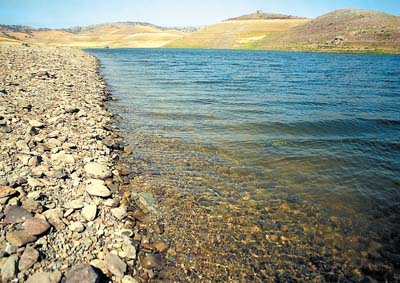By SAMANTHA YOUNG
SACRAMENTO
Gov. Arnold Schwarzenegger declared a state of emergency Friday after three years of below-average rain and snowfall in California, a step that urges urban water agencies to reduce water use by 20 percent.
Mandatory rationing is an option if that and other measures prove insufficient.
“This is a crisis, just as severe as an earthquake or raging wildfire, and we must treat it with the same urgency by upgrading California’s water infrastructure to ensure a clean and reliable water supply for our growing state,” he said in a statement.
In signing the emergency proclamation, Schwarzenegger said California faces its third year of drought and must prepare for more.
The drought has forced farmers to fallow their fields, put thousands of agricultural workers out of work and prompted conservation measures in cities throughout the state.
“This drought is having a devastating impact on our people, our communities, our economy and our environment, making today’s action absolutely necessary,” the governor said in his statement.
The proclamation directs state agencies to provide assistance for affected communities and businesses, orders the Department of Water Resources to protect water quality supplies by installing temporary barriers in the Sacramento-San Joaquin Delta and calls for a statewide conservation campaign.
Three dry winters have left California’s state- and federally operated reservoirs at their lowest levels since 1992.
Federal water managers plan to temporarily cut off water this March to thousands of California farms. The state has said it probably would deliver just 15 percent of the water contractors have requested this year.
Last June, Schwarzenegger declared a statewide drought but stopped short of calling a state of emergency.
His 2008 executive order directed the state Department of Water Resources to speed water transfers to areas with the worst shortages and help local water districts with conservation efforts.
Over the last few weeks, storms have helped bring the seasons’ rain totals to 87 percent of average, but the Sierra snowpack remains at 78 percent of normal for this time of year. State hydrologists say the snowpack must reach between 120 to 130 percent of normal to make up for the two previous dry winters and replenish California’s key reservoirs.
The state delivers water to more than 25 million Californians and more than 750,000 acres of farmland.
Low rain and snowfall hasn’t been the only culprit behind California’s water shortage.
Court decisions intended to protect threatened fish species have forced a significant cutback in pumping from the delta, the heart of the delivery system that conveys water from north to south.
Schwarzenegger, U.S. Sen. Dianne Feinstein, Republican lawmakers, farmers and water agencies have argued for years that California must upgrade its decades-old water supply and delivery system. That includes building new reservoirs and a canal that routes water around the economically fragile delta.
Plans to do so have gone nowhere in the face of opposition from Democrats, who hold majorities in both houses of the Legislature, and environmentalists who say greater conservation is what’s needed.
Those who advocate a revamping of California’s water system say the persistent drought and the effects on cities and the agriculture industry should galvanize support for major improvements.
“The situation is extremely dire,” said Tim Quinn, executive director of the Association of California Water Agencies.
He said Schwarzenegger’s action on Friday “underscores the urgency of serving the long-term structural problems.”
Schwarzenegger’s emergency order leaves the door open for more severe restrictions later. Additional measures can include mandatory water rationing and water reductions.
At least 25 water agencies throughout the state already have imposed mandatory restrictions, while 66 others have voluntary measures in place.
Almond farmer Shawn Coburn of Mendota said the move comes too late for many growers who already are halfway through the season. Some farmers didn’t bring in bees to pollinate, while others sprayed their orchards with chemicals that keep nuts from forming.
“It’s too late,” he said. “It’s going to sound horrible coming from a farmer because you never turn down help, but come on, this thing is over with.”
Associated Press Writer Tracie Cone in Fresno contributed to this report.









